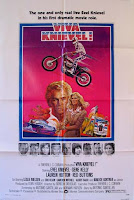Viva Knievel!
 "Buenas tardes," says Frank Gifford, playing himself as an announcer. "That means 'good afternoon.'" And welcome to Viva Knievel!, a film to which subtlety and understatement are completely foreign. Indeed, the tone is set in the very first scene, in which motorcycle daredevil Evel Knievel is introduced as a strange combination of Santa Claus and Mother Teresa. He creeps into an orphanage at dead of night to hand out scale action figures of himself to the institution's unlucky residents, not to mention to make the lame walk: "You're the reason I'm walking, Evel!" exclaims one little critter, throwing his crutches away. "You're the reason!" Our hero has even thought to bring some fudge for the nun who oversees the unfortunate, so calming her ire at his unannounced arrival. And when she bids him farewell by calling him "Brother Evel," it ain't no nod to African American homeboy slang. There's a saint among us, and he also looks awful spiffy in his red, white, and blue leather jumpsuit.
"Buenas tardes," says Frank Gifford, playing himself as an announcer. "That means 'good afternoon.'" And welcome to Viva Knievel!, a film to which subtlety and understatement are completely foreign. Indeed, the tone is set in the very first scene, in which motorcycle daredevil Evel Knievel is introduced as a strange combination of Santa Claus and Mother Teresa. He creeps into an orphanage at dead of night to hand out scale action figures of himself to the institution's unlucky residents, not to mention to make the lame walk: "You're the reason I'm walking, Evel!" exclaims one little critter, throwing his crutches away. "You're the reason!" Our hero has even thought to bring some fudge for the nun who oversees the unfortunate, so calming her ire at his unannounced arrival. And when she bids him farewell by calling him "Brother Evel," it ain't no nod to African American homeboy slang. There's a saint among us, and he also looks awful spiffy in his red, white, and blue leather jumpsuit.As the plot unfolds, it turns out to involve unscrupulous businessman who arrange for Knievel to attempt one of his death-defying stunts in Mexico with the plan of sabotaging his bike and so ensuring the jump is terminal. Then the subsequent coffin-laden caravan can pass unmolested across the border on its return to the USA, so enabling our devilish masterminds to smuggle 3,000 packets of cocaine in a the false panels of a duplicate version of Knievel's outsize trailer. No doubt about it, these are bad, bad men. Thank goodness Evel is around to ensure that their plot is foiled, and while he's at it to unite his mechanic and friend with a long-estranged son as well as to soften the heart of a hard-bitten feminist reporter. Everyone in this film is putty in Evel's tough but tender hands.
Presumably the Mexicans are also enthralled by the presence of their illustrious visitor. A state governor lays on a welcome party and gives him the run of a hacienda. "I've always heard you were the warmest of neighbors, governor, and I appreciate it" Knievel replies. Forthwith, a lovely señorita throws the man a single rose from a nearby balcony. But we never see her again, and indeed on the whole the Mexicans provide no more than such passing decoration. For instance, at the stadium in which Evel is to show off his courage and motorcycling skill, we see a Spanish-language announcer perched in the commentary box next to Gifford, as well as the stands packed with cheering fans, including at least one complete mariachi band, plus a phalanx of Aztec warriors flank the pit of flames that Knievel's bike is to jump. Then at the movie's climax, Evel leads his pursuers a merry dance by riding at speed through a local village ironically called "Verde" (in a petrol-obsessed movie in which otherwise only the grass and the Mexican flag show even hints of green). Chickens, goats, and villagers go flying as the dusty streets become an obstacle course for our man to show off his impromptu driving skills. Otherwise, everyone in this movie, hero and villain alike, is as red, white, and blue as Knievel's jumpsuit, helmet, bike, trailer, and other assorted accoutrements. Even the hospital to which our man's sidekick is taken (in a sneaky attempt to prevent him from revealing the bad guys' dastardly secrets) is run for and by US citizens alone.
So why the Latin touches to Knievel's über-patriotic antics? Why viva Kneivel? Well, the drugs come from Mexico, of course, even if this film suggests that the locals are apparently not crafty enough to organize their own supply lines. But Mexico's also both a seduction and a promise. A seduction in that it's a source of addiction: not only the cocaine to which Evel's protégé falls prey, but also the tequila that is his mentor's not so secret vice. This is a manifestly moral film: Knievel warns against the dangers of drugs at every opportunity. Borders therefore need to be enforced, their and our weaknesses rectified. On the other hand, the porousness of the frontier between North and South offers the promise of universality. Knievel has to be as raucously welcomed in Jalapa as in Long Beach. For sainthood knows no territorial boundaries: Evel's goodness has to rise above its national origins, just as the petty criminal from Butte, Montana managed to transcend his provincial origins to become every young boy's hero and (if this film is to believed) every woman's dream date.
 And strangely, it's only in Mexico that he manages to avoid crashing the damn bike.
And strangely, it's only in Mexico that he manages to avoid crashing the damn bike.YouTube Link: documentary footage of the crash that made Knievel's name.
Bonus Link: an impressive collection of Knievel comedy, courtesy of Evel Incarnate.
Labels: border, masculinity
